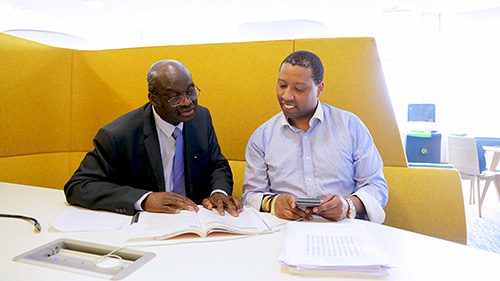Search
Financial Management and Accounting BA (Hons)
Study level: UndergraduateHNC/HND courses

The Financial Management and Accounting BA (Hons) course aims to provide you with a solid grounding for building a career in accounting and finance.
Course features
Course option
Year of entry
Location
CU Coventry (Coventry)
Study mode
Full-time
Part-time
Sandwich
Duration
4 years sandwich
3 year - Degree
2 year - HND
1 year - HNC
Flexible part-time
UCAS codes
392N / 393N / 394N
Start date
January 2026
March 2026
May 2026
June 2026
Course overview
The Financial Management and Accounting BA (Hons) degree aims to enable you to make a valuable contribution to managerial and accounting functions of any organisation, including sole traders, partnerships, private and public companies, and charitable organisations.
Why you should study this course
You should study this course if you want to:
- further enhance your knowledge of mathematical and business principles, as well as the theories and concepts involved in investment risk and professional ethics
- develop and embed your sense of commercial awareness
- demonstrate an understanding of the role of a finance organisation.
The academic teams on this course include practicing accountants and are members of professional accounting bodies, staff may be subject to change.
What you'll study
We regularly review our course content, to make it relevant and current for the benefit of our students. For these reasons, course modules may be updated.
How you'll learn
Our teaching methods for the degree courses are varied depending on which course/modules you take, offering a number of teaching styles to suit the needs of our students, so in addition to lectures, we also utilise a blended learning approach, including online aspects, workshops and group work. We also operate an open-door policy, with additional availability via email and our current online learning platform, Aula.
Teaching contact hours
As a full-time undergraduate student, you will study modules totalling 120 credits each academic year. A typical 20 credit module requires a total of 200 hours study. This is made up of teaching contact hours, guided and independent study.
Teaching hours:
Teaching hours vary depending on year of study and due to module selection. During your first year you can expect 15-18 teaching hours each week. You will also have the option to attend optional sessions including time with a progress coach or to meet with staff for advice and feedback. As you progress through your studies, teaching hours may reduce.
Guided and independent study:
Throughout your studies, you will be expected to spend time in guided and independent study to make up the required study hours per module. You’ll be digging deeper into topics, review what you’ve learned and complete assignments. This can be completed around your personal commitments. As you progress through your studies, you’ll spend more time in independent study.
Online learning:
As an innovative university, we use different teaching methods including online tools and emerging technologies. So, some of your teaching hours and assessments may be delivered online.
Assessment
This course will be assessed using a variety of methods which will vary depending upon the module. The assessment methods may include:
- phase tests
- essays
- group work
- reports
projects - individual assignments.
The Coventry University Group assessment strategy ensures that our courses are fairly assessed and allows us to monitor student progression towards achieving the intended learning outcomes.
Entry requirements
Typical entry requirements:
Fees and funding
| Student | Full-time | Part-time |
|---|---|---|
| UK, Ireland*, Channel Islands or Isle of Man | £9,535 per year | Not available |
| EU | £9,535 per year with EU Support Bursary** £14,800 per year without EU Support Bursary** |
Not available |
| International | £14,800 per year | Not available |
If you choose to study this course with a professional placement2 or study abroad year, you will need to pay a tuition fee3 to cover your academic support throughout your placement year. Students commencing their professional placement in the academic year 2027/28 will pay £1,500 if they are paying UK fees, or £1,800 if they are paying international fees.
For advice and guidance on tuition fees and student loans visit our Fees and funding page and see the university’s Tuition Fee and Refund Terms and Conditions.
The University will charge the tuition fees that are stated in the above table for the first Academic Year of study. The University will review tuition fees each year. For UK (home) students, if Parliament permits an increase in tuition fees, the university may increase fees for each subsequent year of study in line with any such changes. Note that any increase is expected to be in line with inflation.
If you choose to study this course with a professional placement, the University will charge the tuition fees stated above for those on a placement during Academic Year 2027/28. The University will review professional placement tuition fees each year. For UK (home) students, the University may increase fees for each subsequent year of study, but such that it will be no more than 5% above inflation.
For international students, we may increase fees each year, but such increases will be no more than 5% above inflation. If you defer your course start date or have to extend your studies beyond the normal duration of the course (e.g. to repeat a year or resit examinations) the University reserves the right to charge you fees at a higher rate and/or in accordance with any legislative changes during the additional period of study.
We offer a range of international scholarships to students all over the world. For more information, visit our international scholarships page.
Tuition fees cover the cost of your teaching, assessments, facilities and support services. There may be additional costs not covered by this fee such as accommodation and living costs, recommended reading books, stationery, printing and re-assessments should you need them.
The following are additional costs not included in the tuition fees:
- Any optional overseas field trips or visits: £400+ per trip.
- Any costs associated with securing, attending or completing a placement (whether in the UK or abroad).
*Irish student fees
The rights of Irish residents to study in the UK are preserved under the Common Travel Area arrangement. If you are an Irish student and meet the residency criteria, you can study in England, pay the same level of tuition fees as English students and utilise the Tuition Fee Loan.
**EU Support Bursary
Following the UK's exit from the European Union, we are offering financial support to all eligible EU students who wish to study an undergraduate or a postgraduate degree with us full-time. This bursary will be used to offset the cost of your tuition fees to bring them in line with that of UK students. Students studying a degree with a foundation year with us are not eligible for the bursary.
Facilities
The modern CU Coventry Mile Lane campus has been designed to promote collaboration, creativity, and innovation4.
- indoor and outdoor social spaces, including a ground floor café
- a ground floor library that includes loan laptops and a silent study area
- open-access IT suites
- student support and careers advice teams.
CU Coventry students also have access to facilities located on the Coventry University campus. These include the Lanchester Library and The Hub4.
Facilities are subject to availability. Access to some facilities (including some teaching and learning spaces) may vary from those advertised and/or may have reduced availability or restrictions where the university is following public authority guidance, decisions or orders.
Careers and opportunities
Upon successful completion of the Financial Management and Accounting BA (Hons), you will be able to:
- evaluate the legal, ethical and social context, in which accounting can be seen as operating in the accountancy profession - business entity, the capital markets and the public sector
- apply the main current technical language and practices of accounting in regard to recognition, measurement and disclosure of financial statements, managerial accounting, auditing and taxation on a national and international basis
- critically evaluate the main current technical language and practices of accounting in regard to alternative recognition rules and valuation bases, accounting rules applicable nationally and internationally, different managerial accounting methods used in management control and decision-making
- apply the relevant skills in recording and summarising transactions and other economic events, preparation of financial statements using international standards, performance measurement of managers and business entities, management control, analysis of financial ratios or performance indicators, discounted cash flow analysis, budgeting and forecasting, and financial options and associated risks. These skills must be in the contexts in which accounting data and information is processed and provided within a variety of organisational environments
- critically evaluate contemporary theories and empirical evidence, concerning the operation and effects of accounting, in the contexts of accounting and accountability, accounting and corporate governance, accounting and capital markets, accounting and sustainability, and auditing
- appreciate the nature of the contexts in which finance can be seen as operating, including knowledge of the institutional framework necessary for understanding the role, operation and function of markets and financial institutions
- develop an understanding of the financing arrangements and governance mechanisms and structures of business entities, and a better appreciation of how theory and evidence can be combined to assess the effectiveness and efficiency of such arrangements (e.g. decisions as to sources of finance and financial structure of the pricing of corporate securities, the market for corporate control, corporate governance, financial planning and the international dimensions of finance).
Where our graduates work
Upon graduation, this course could open doors to a wide range of career opportunities in roles, such as chartered and certified accountant, finance and investment analyst, taxation expert financial manager and advisor. Some roles may require additional training and incur additional costs.





